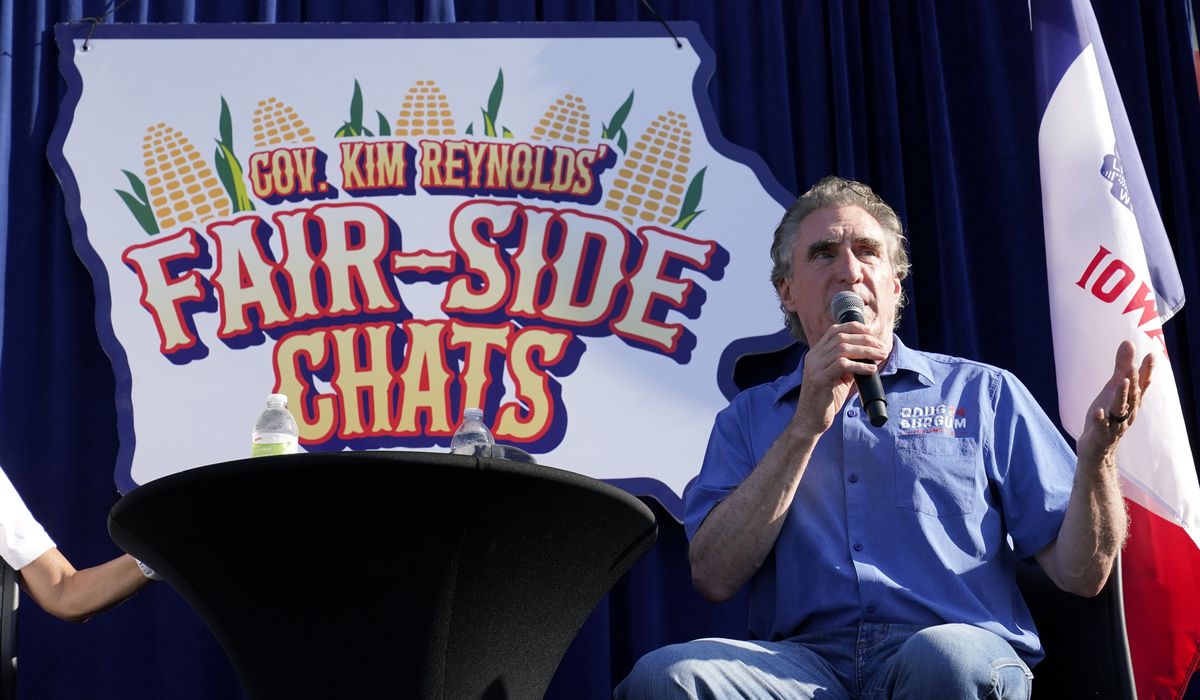

The Other Guys: Lesser known GOP White House hopefuls get a turn in the spotlight at Iowa State Fair

DES MOINES, Iowa — North Dakota Gov. Doug Burgum is making the rounds at the iconic Iowa State Fair, touting his small-town roots and promising a “180-degree” turn from President Biden’s policies that he says hurt Americans of every political stripe.
Mr. Burgum is among the lesser-known Republican presidential contenders that have made their way to the fair to introduce themselves to voters and try to steal a bit of the spotlight away from former President Donald Trump, Florida Gov. Ron DeSantis and other high-profile contenders.
Mr. Burgum, a billionaire who grew up in a small North Dakota town and made his fortune investing in the tech industry, said the first thing he will do as president is take a more pro-American stance on energy.
“The Biden administration, I say their energy policy was designed by China because if you want to go all-electric vehicles it is basically a war on liquid fuels,” Mr. Burgum said during a fireside chat here with Iowa Gov. Kim Reynolds. “It is a war on liquid fuels. It is a war on America.”
“We have a chance not only to be energy independent, but we can be energy dominate,” he said. “We can be an energy superpower.”
Mr. Burgum and others among the lesser-known contenders have flipped pork chops, gobbled down corn dogs and strolled past the Iowa State Fair’s famous butter cow.
They addressed voters from the Des Moines Register soapbox and sat down for a public chat with Ms. Reynolds, the state’s popular Republican governor.
They fielded questions from voters about the US-Mexico border, the national debt and the Ukraine-Russia war. And they have done a little brownnosing, saying that Iowans’ political IQ is off the charts.
Onlookers sometimes struggle to put names with faces, and often have fallen back on a familiar question: “Who’s that?”
The lack of familiarity is another stumbling block for candidates working to reach the polling and donation thresholds the Republican National Committee set to get on stage at the first debate later this month in Milwaukee.
The candidates, as a result, have gotten creative. Mr. Burgum doled out $20 gift cards in exchange for donations to his campaign.
Others have hired canvassers — some of them self-identified Democrats — from out of state that have come to help them sign up supporters.
Among the GOP hopefuls pleading for donations was Larry Elder, a conservative commentator who is African American and unsuccessfully ran for governor of California last year.
Mr. Elder said the “epidemic of fatherless“ is the “most serious domestic problem” facing the nation, saying kids raised without a father are far more likely to be poor, drop out of school and end up in jail.
“It is an outrage our society is not talking more about this,” he said. “The other side doesn’t talk about it because they caused it. Our side doesn’t talk about it for fear of being accused of making a cultural determination and a fear of being accused of being a racist.”
Miami Mayor Francis Suarez painted himself as a forward-looking “compassionate” conservative. The 44-year-old son of Cuban refugees said he has the sort of political makeup that would make him “impossible for the Democrats” to beat in a general election.
“If we could win Hispanics, if we could win urban voters, which I’ve done already, and young voters it is game over,” Mr. Suarez said. “There isn’t a place in the United States for Democrats to win. I have already done that. I have proven I have a track record of connecting with those voters.”
Mr. Suarez said the “freedom agenda” he has pushed — lowering taxes, addressing homelessness and increasing police funding — has led to double-digit economic growth, reduced violent crime and helped turn Miami into a hub for technology and innovation.
“You guys remember Miami Vice?” Mr. Suarez said of the popular 1980s television show. “Now it is Miami nice.”
Businessman Perry Johnson focused on the soaring national debt. He vowed to cut two cents for every dollar spent on discretionary spending, the money Congress plays with every year to fund defense and domestic programs.
“Right now I believe we are going broke, in fact, let’s face maybe we are broke,” Mr. Johnson said. “I spent my entire life bringing quality and efficiencies to companies and now I want to bring it to the federal government.”
Mr. Johnson, the son of a World War II pilot and Army nurse, vowed to shut down the Department of Education and redistribute the money spent there to the states.
“I want to bring quality and efficiency to the federal government,” he said. “In fact, I am probably the worst guy in the world for Washington, and I know they hate me.”
• Seth McLaughlin can be reached at smclaughlin@washingtontimes.com.
